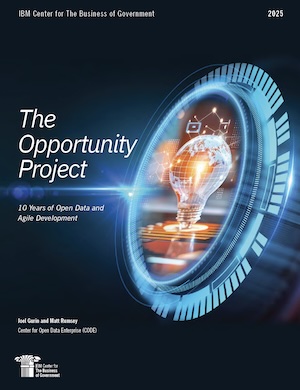
Driving Improved Government Performance Through Open Data and Agile Development

The Opportunity Project (TOP), housed at the U.S. Department of Commerce, has for 10 years served as a model for using data and agile approaches to address problems identified by government agencies. TOP has facilitated the creation of hundreds of digital tools that address critical issues across a broad range of key mission areas in multiple agencies. In a new report from the IBM Center, The Opportunity Project: 10 Years of Open Data and Agile Development, authors Joel Gurin and Matt Rumsey with the Center for Open Data Enterprise address critical factors that have contributed to TOP’s impact.
By organizing agile “sprints” around specific themes, such as financial and economic priorities, TOP has focused efforts on rapid prototyping of targeted solutions to pressing issues. This thematic organization ensures that strategies to address problem statements are well-aligned with the goals of key agency stakeholders, and fosters collaboration among participants working towards common objectives.
The impact of TOP extends beyond the development of digital tools. The program has educated a new generation of open government data users—building reciprocal relationships between government data stewards and users, and enhancing the accessibility and usability of large government data sets. Through a collaborative process, TOP has brought innovative strategies and agile methodologies to agencies, supporting a more flexible and user-centered government workforce.
This report also includes detailed case studies that illustrate the many ways in which TOP has made a difference, and demonstrate the tangible benefits of TOP’s approach. The case studies highlight the program’s ability to spark change and foster ongoing collaboration between government and nongovernment participants.
The report demonstrates how TOP has had a strong positive impact with participants from other federal agencies, companies, NGOs, academic institutions, communities, and individual tech volunteers. The program has educated a new generation of open government data users, kickstarted ongoing collaborations between government agencies and their stakeholders, built more reciprocal and less extractive relationships between government data stewards and communities, made it easier to access and use large government data assets, improved data discoverability and accessibility, enhanced usability, and helped commercial organizations support positive change with open data.
The authors conclude with six recommendations, based on lessons learned through TOP’s projects, to continue to strengthen TOP and increase the ability of this and similar programs to benefit communities through open government data. These recommendations include:
- Continue to focus on building trust and understanding between participants.
- Encourage sprint leaders to tailor the ways they support participants.
- Explore strategies to provide additional resources to participants.
- Return to organizing sprints thematically.
- Continue to evolve virtual and in-person convening models.
- Engage with others promoting agile development in government.
The lessons learned from TOP’s experience provide valuable insights for agencies seeking innovate approaches to address complex challenges. Through thematic sprint cycles, TOP serves as a catalyst for innovation and a model for agile problem-solving in government. This report not only records the progress of TOP, but also offers a roadmap for the continued evolution and growth of this and similar efforts in the future.



